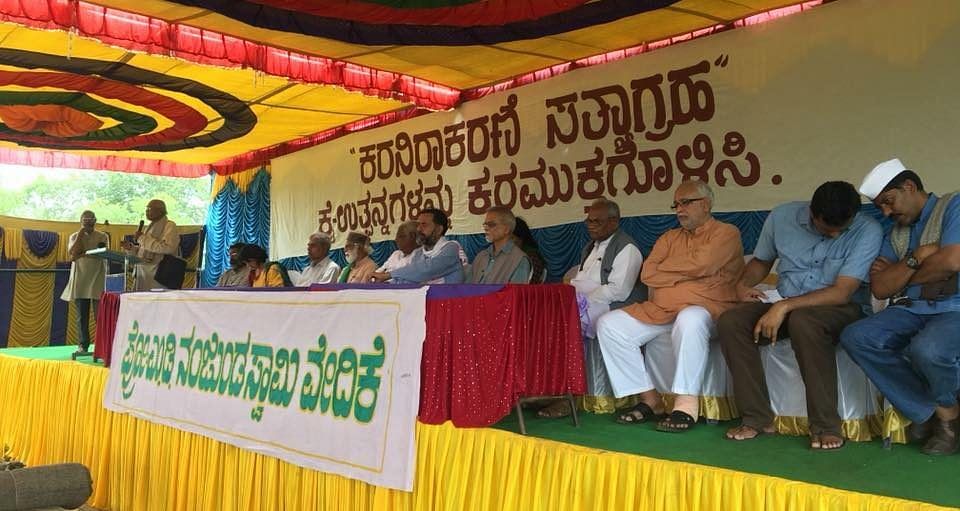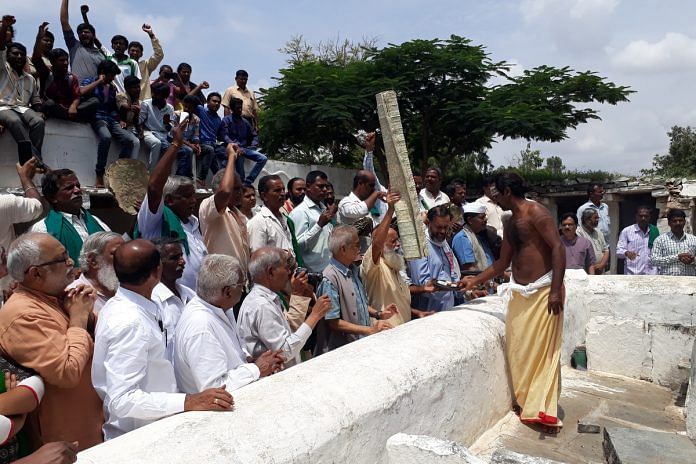New tax regime hikes prices of handloom yarn and other products, posing a threat to livelihoods of thousands of weavers and artisans.
The Tax Denial Satyagraha against the levying of the Goods and Services Tax (GST) on handmade products began at Junjappa’s shrine in a village near Sira, Karnataka, last week. Junjappa is a revered deity of the cowherds (gollas) of south Karnataka. For the satyagrahis, he is a deity of ecological wisdom.
The struggle is as much about keeping the GST out of the handmade sector as it is about the crafting of an ethical vision for our times.
Exempt from tax since India’s independence, the venerable world of handmade goods has now been brought under the GST. The new tax regime hikes the cost of handloom yarn and cloth, pottery, mats, baskets and many other handmade products, making their fate in the market more precarious vis-à-vis the cheaply produced factory items. The livelihoods of lakhs of weavers and artisans face a new risk.
Led by Prasanna, theatre director and member of Grama Seva Sangha, and other veteran activists in the field of handmade textiles, like Uzramma, the satyagraha makes two chief demands of the government:
1. Introduce zero-tax on natural products, grown through natural farming, such as natural foods, natural cotton, etc, by treating them as handmade products.
2. Introduce punitive tax on polluting or carbon intensive products.
These demands affirm life: they sustain those who work in the handmade sector and foster an environment-friendly industry; they encourage natural farming, which keeps away fertilizers and pesticides; and they deter industrial manufacturing methods that ravage the environment.

Since the GST applies to only those weavers and artisans earning more than Rs 20 lakh annually, it is possible that the tax architects imagined them as individuals with incomes below that limit. This presumption though is myopic.
For instance, individual artisans can come together as a co-operative to better organise themselves as sellers. They would then be subject to tax. GST weakens the bargaining power of the handmade sector. Besides, the cost of raw materials sold by large retailers, like yarn, for instance, goes up due to the GST, indirectly hiking the price of the handmade goods.
The satyagrahis also ask that the economy be seen in ethical terms: How do we build a non-violent economy, a non-polluting economy, an economy that nurtures a co-operative, and not a competitive, spirit among the citizens?
Building a self-reliant economy is a political matter as well. The destruction of local production systems in favour of large industry and financial centralisation diminishes political freedom at the grassroots. In pointing out such issues, the satyagraha invokes the hundred-year-old ideals of ‘swadeshi’ (self-reliance) and ‘swaraj’ (self-rule). Is it unthinkable that political parties can commit to simple living in the present?
The satyagraha, for Prasanna, is a consumers’ struggle too: it is a means of atonement for their complicity with the harm large factories cause to the environment.
Further, in sharp contrast with futuristic utopias, the satyagraha views physical labour as an integral part of a civilised society. Everyone needs to embrace it. This ethical stance continues the great saintly tradition in the country, where saints did not separate the pursuit of a morally meaningful life from a dedication to work. Kabir was a weaver. Ravidas was a cobbler.
Prasanna notes in exasperation the policy neglect of the cultural significance of physical labour: “The word, ‘hand’ does not appear anywhere in the GST document!”
A rich repository of artisanal creativity and knowledge, the handmade sector ought to find a cherished place in the economy. It doesn’t pollute the environment or generate excess waste. It offers lessons in non-violent engagements with nature.
Nurturing the handmade sector is to enliven artisanal creativity, to disallow the standardisation of design and style across the country. Anyone who cares for India’s diversity, an achievement in which the handmade sector plays a large role — the variety of sarees, blankets, pots, mats, among others, boggles the mind – will easily see the cultural significance of this satyagraha.
Employing over one crore Indians, the handmade sector, the second largest sector in rural India after agriculture, is diverse in another sense: tribals, lower and upper caste groups, Muslims as well as Christians are found here
The handmade sector needs to be nourished, no doubt.
The Tax Denial Satyagraha obliges the government to view the economy in ethical terms, in culturally sensitive ways. It also asks Indians to rethink the fundamentals: How do we live in socially, politically and ecologically responsible ways?
The author is a Professor of Sociology at the Azim Premji University in Bengaluru



